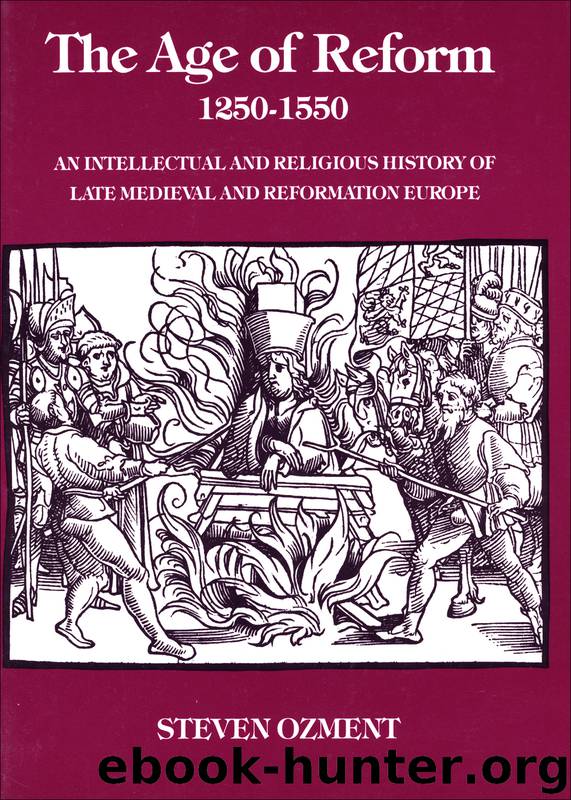The Age of Reform, 1250-1550 by Steven Ozment

Author:Steven Ozment
Language: eng
Format: epub
Publisher: Yale University Press
Published: 1980-07-21T16:00:00+00:00
Thomas Müntzer. Christoffel von Sichem the Elder. Müntzer, perhaps Luther’s most effective critic, has become the most influential sixteenth-century dissenter from the Reformation, especially in Marxist historiography. After failing to win the Saxon princes to his radical program of reform, he sent a call to arms to his followers in the city of Sangerhausen: “I tell you the time has come for bloodshed to fall upon this impenitent and unbelieving world.… Why do you continue to let yourselves be led around by your noses? One knows full well and can prove it with Scripture that lords and princes as they now present themselves are not Christians. Your priests and monks pray to the devil and there are ever fewer true Christians. All your preachers have become hypocrites and worshippers of man. Why do you continue to place your hope in them?” Following his execution for his role in the Peasants’ Revolt, Miümtzer’s rebellious life and teaching became the subject of a didactic tract by Luther, who pointed out the terrible lessons to be learned from “The Horrible History and Judgment of God upon Thomas Müntzer” (Wittenberg, 1525).
After the suppression of the revolt, Luther came under sharp criticism both for his “hard book” against the peasants and for having been the inspiration of the revolt in the first place. One of the most stinging critiques came from Johannes Findling, a Catholic apologist who had been general commissioner of indulgences when Luther posted his ninety-five theses in 1517. Findling’s popular tract bore the title Luther Speaks with Forked Tongue, or, How Luther, on the One Hand, Led the Peasants Astray, While, on the Other, He Condemned Them. Findling traced the revolt to Luther’s own challenge of higher authority in the Reformation tracts of 1520.95 He compared Luther’s belated condemnation of the peasants to his earlier efforts to disassociate himself from Wittenberg iconoclasm (1521–22), which also derived, in Findling’s view, from Luther’s own teaching.96 In both cases Findling found Luther’s actions politically motivated. Even the Admonition to Peace was seen as encouraging the peasants by its sharp criticism of the lords and princes.97
Such criticism forced replies from Luther and his supporters. The Königsberg pastor, Johannes Poliander (Gramann), writing to still the “swift, intolerant cry everywhere against Luther,” accused the majority of Luther’s critics of being disappointed supporters of the revolution. According to Poliander, Luther, like Moses, had tried to lead the peasants to a better life and called punishment down on them only after they had proven themselves unworthy.98 Luther himself remained utterly unapologetic; he dismissed his critics, who demanded mercy for the peasants, as bleeding-heart hypocrites.
Suppose I were to break into a man’s house, rape his wife and daughters, break open his coffers, take his money, set a sword to his breast, and say: “If you will not put up with this, I shall run you through, for you are a godless wretch.” Then, if a crowd gathered and were about to kill me for doing this, or if the judge ordered
Download
This site does not store any files on its server. We only index and link to content provided by other sites. Please contact the content providers to delete copyright contents if any and email us, we'll remove relevant links or contents immediately.
The Gnostic Gospels by Pagels Elaine(2531)
Jesus by Paul Johnson(2363)
Devil, The by Almond Philip C(2333)
The Nativity by Geza Vermes(2231)
The Psychedelic Gospels: The Secret History of Hallucinogens in Christianity by Jerry B. Brown(2158)
Forensics by Val McDermid(2094)
Going Clear: Scientology, Hollywood, and the Prison of Belief by Lawrence Wright(1985)
Going Clear by Lawrence Wright(1968)
Barking to the Choir by Gregory Boyle(1822)
Old Testament History by John H. Sailhamer(1816)
Augustine: Conversions to Confessions by Robin Lane Fox(1773)
The Early Centuries - Byzantium 01 by John Julius Norwich(1745)
A History of the Franks by Gregory of Tours(1729)
A Prophet with Honor by William C. Martin(1726)
Dark Mysteries of the Vatican by H. Paul Jeffers(1723)
The Bible Doesn't Say That by Dr. Joel M. Hoffman(1681)
by Christianity & Islam(1636)
The First Crusade by Thomas Asbridge(1610)
The Amish by Steven M. Nolt(1574)
